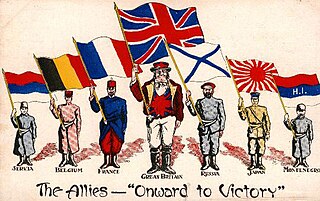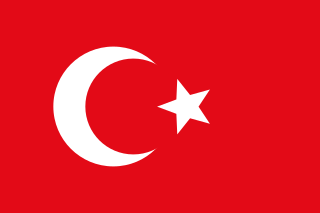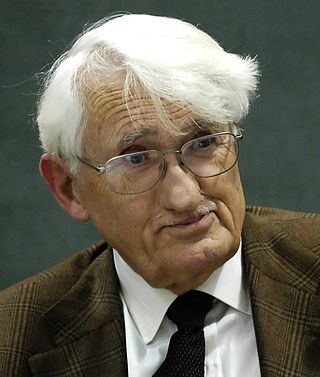Citizenship is a membership and allegiance to a sovereign state.
Nationality is the status of belonging to a particular nation, defined as a group of people organized in one country, under one legal jurisdiction, or as a group of people who are united on the basis of culture.
A nation is a large type of social organization where a collective identity has emerged from a combination of shared features across a given population, such as language, history, ethnicity, culture, territory or society. Some nations are constructed around ethnicity while others are bound by political constitutions.
The right of return is a principle in international law which guarantees everyone's right of voluntary return to, or re-entry to, their country of origin or of citizenship. The right of return is part of the broader human rights concept freedom of movement and is also related to the legal concept of nationality. While many states afford their citizens the right of abode, the right of return is not restricted to citizenship or nationality in the formal sense. It allows stateless persons and for those born outside their country to return for the first time, so long as they have maintained a "genuine and effective link".
Chinese nationality may refer to:
Polyculturalism is an ideological approach to the consequences of intercultural engagements within a geographical area which emphasises similarities between, and the enduring interconnectedness of, groups which self-identify as distinct, thus blurring the boundaries which may be perceived by members of those groups.
In the Ottoman Empire, a millet was an independent court of law pertaining to "personal law" under which a confessional community was allowed to rule itself under its own laws.
An ethnocracy is a type of political structure in which the state apparatus is controlled by a dominant ethnic group to further its interests, power, dominance, and resources. Ethnocratic regimes in the modern era typically display a 'thin' democratic façade covering a more profound ethnic structure, in which ethnicity – and not citizenship – is the key to securing power and resources.

National identity is a person's identity or sense of belonging to one or more states or one or more nations. It is the sense of "a nation as a cohesive whole, as represented by distinctive traditions, culture, and language". National identity may refer to the subjective feeling one shares with a group of people about a nation, regardless of one's legal citizenship status. National identity is viewed in psychological terms as "an awareness of difference", a "feeling and recognition of 'we' and 'they'". National identity also includes the general population and diaspora of multi-ethnic states and societies that have a shared sense of common identity identical to that of a nation while being made up of several component ethnic groups. Hyphenated ethnicities are examples of the confluence of multiple ethnic and national identities within a single person or entity.

Kemalism, also known as Atatürkism, or The Six Arrows, is the founding and official ideology of the Republic of Turkey based on the ideas and legacy of Mustafa Kemal Atatürk.

Ottomanism or Osmanlılık was a concept which developed prior to the 1876–1878 First Constitutional Era of the Ottoman Empire. Its proponents believed that it could create the social cohesion needed to keep millets from tearing the empire apart.
Civic nationalism, otherwise known as democratic nationalism and liberal nationalism, is a form of nationalism that adheres to traditional liberal values of freedom, tolerance, equality, and individual rights, and is not based on ethnocentrism. Civic nationalists often defend the value of national identity by saying that individuals need it as a partial shared aspect of their identity in order to lead meaningful, autonomous lives and that democratic polities need a national identity to function properly.

Constitutional patriotism is the idea that people should form a political attachment to the norms and values of a pluralistic liberal democratic constitution rather than to a national culture or cosmopolitan society. It is associated with post-nationalist identity because, while it is seen as a similar concept to nationalism, the attachment is based on the constitution rather than on a national culture. In essence, it is an attempt to re-conceptualize group identity with a focus on the interpretation of citizenship as a loyalty that goes beyond individuals' ethnocultural identification. Theorists believe this to be more defensible than other forms of shared commitment in a diverse modern state with multiple languages and group identities. It is particularly relevant in post-national democratic states in which multiple cultural and ethnic groups coexist. It was influential in the development of the European Union and a key to Europeanism as a basis for multiple countries belonging to a supranational union.
Ethnic democracy is a political system that combines a structured ethnic dominance with democratic, political and civil rights for all. Both the dominant ethnic group and the minority ethnic groups have citizenship and are able to fully participate in the political process. Ethnic democracy differs from ethnocracy in that elements of it are more purely democratic. It provides the non-core groups with more political participation, influence and improvement of status than ethnocracy supposedly does. Nor is an ethnic democracy a Herrenvolk democracy which is by definition a democracy officially limited to the core ethnic nation only.
A de facto republic where Greek and Turkish Cypriots share many customs but maintain distinct identities based on religion, language, and close ties with their respective "motherlands", Cyprus is an island with a highly complex history of nationality due to its bi-communal nature and the ongoing conflict between the two groups. An internationally recognized region, Cyprus is partitioned into four main parts under effective control of the Republic of Cyprus, the Turkish Republic of Northern Cyprus, the UN-controlled Green Line, and British bases Akrotiri and Dhekelia respectively. Despite its history of conflict, the Green Line is now open and neighborly relationships are being fostered between the two groups.

Nationalism studies is an interdisciplinary academic field devoted to the study of nationalism and related issues. While nationalism has been the subject of scholarly discussion since at least the late eighteenth century, it is only since the early 1990s that it has received enough attention for a distinct field to emerge.
Among scholars of nationalism, a number of types of nationalism have been presented. Nationalism may manifest itself as part of official state ideology or as a popular non-state movement and may be expressed along civic, ethnic, language, religious or ideological lines. These self-definitions of the nation are used to classify types of nationalism, but such categories are not mutually exclusive and many nationalist movements combine some or all of these elements to varying degrees. Nationalist movements can also be classified by other criteria, such as scale and location.

Azerbaijani nationality law is regulated by the Constitution of Azerbaijan, as amended; the Citizenship Law of Azerbaijan and its revisions; and various international agreements to which the country is a signatory. These laws determine who is, or is eligible to be, an Azerbaijani national.
Territorial nationalism describes a form of nationalism based on the belief that all inhabitants of a particular territory should share a common national identity, regardless of their ethnic, linguistic, religious, cultural and other differences. Depending on the political or administrative status of a particular territory, territorial nationalism can be manifested on two basic levels, as territorial nationalism of distinctive sovereign states, or territorial nationalism of distinctive sub-sovereign regions.
Ethnic nationalism, also known as ethnonationalism, is a form of nationalism wherein the nation and nationality are defined in terms of ethnicity, with emphasis on an ethnocentric approach to various political issues related to national affirmation of a particular ethnic group.





